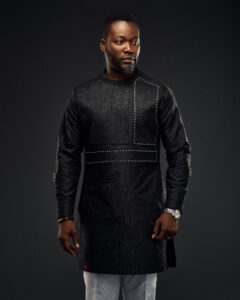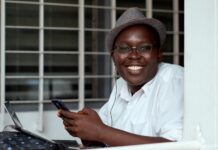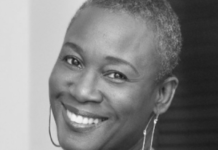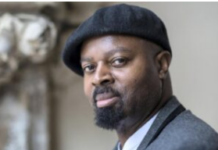We are thrilled to present an insightful and candid interview with Adjetey Anang, celebrated actor and author of the newly launched book, Adjetey Anang: A Story of Faith, Imperfection, and Resilience. In this engaging conversation with Vanessa O. Vanderpuye, Adjetey Anang reflects on the inspiration behind penning his memoir and shares profound insights into his life, career, and the principles that have guided him.
VANESSA O. VANDEWRPUYE: First of all, congratulations on the launch of your book, Adjetey Anang: A Story of Faith, Imperfection, and Resilience. What was the inspiration behind writing your memoir and what did you hope readers will take away from it?

ADJETEY ANANG: Well, the inspiration behind writing this book was that I wanted to break the cycle of getting to the end of your career or when you’ve seen it all, done it all at an old age, then you write a memoir, a biography, autobiography, and all that. And I thought that that would be a bit late because the people who are walking your path, the people who are about to make the same mistakes you made, the people who need guidance, a word of encouragement now, and so waiting for how many years would not do them any good. I would rather write a book at a prime age of 50 so that those who are just walking into the limelight or those who are already in the limelight and facing certain challenges would have some encouragement, would have some advice, would have some insight into choices that can make them, can make them or unmake them. And so, I thought it was right for me to do this now other than wait for it later.
What I wish that they take out of this amongst the many things would be that life throws at you all kinds of things and you must be prepared to withstand whatever challenges or difficulties that are thrown at you. You must know that you are fallible, you have weaknesses, and you must be sincere about your weaknesses and seek help. Especially coming from an epitropical area of culture of masculinity and all that, it’s tough for people to own up to their shortfalls because they’re considered as weaklings, especially for guys. So, for me, for them to own up to their mistakes and also be better versions of themselves.
VOV: Celebrating your 50th birthday alongside the book launch must have been a significant moment. As you reflect on your journey so far, what are the key lessons or principles that have guided you, and how do you plan to approach the next chapter of your career and life?
AA: Well, a few of the lessons or principles that have guided me, I mean, one of which would be that I see life as, you know, for what we leave behind. It’s not what is written in stone monuments, but what is woven into the lives of people. And so, for me, people, it’s a first point of call that you’re selfless and know that your service to humanity is what will bring you the rewards and favor and what-have-you. So, more concerned about touching people’s lives.

And of course, another would be having boundaries. I think that everyone must have their personal boundary, whatever you call it, whether it’s moral, whether it’s whatever you know, but if you don’t have boundaries, then you leave yourself too open, and therefore anything goes, as it were.…for example, your relationship with your fan base, … there’s a tendency for people to feel that they connect with you so much that, you know, they can come into your space as and when they want to at will. But when you don’t put those boundaries there, and then you invite all sorts of characters into your space and that would be a conflict with your loved… That distinction must be clear that this is how far you can come as a fanbase and therefore what I talk to you about is limited, what we chat about is limited, it doesn’t flow into intimacy, it doesn’t flow into other areas that are the exclusivity of those that I consider close persons, you know.
The way I intend to face the next phase of my career is to now make an impact. We’ve seen faith. We’ve seen imperfections. We’ve seen resilience. And so now it’s to make an impact based on the lessons that I’ve learnt strengthening my faith of course. But more importantly, ensuring that I leave my mark. And it’s felt in people’s lives. More of reading as well in my area of career. You know, I never came to a point where I knew it all or had seen it all. There’s still so much to learn. The fact that I even have an opportunity to lecture students. For me it’s an opportunity to give to them on a daily basis. And I never recline and say to them, ‘you know what: you’re not where I am, and so. I am cool. I am a Master’. No. It’s like everyday I’m learning a new thing. Everyday I am reading. For them to first of all see themselves as the best version of us. They have to be better than us. That’s my goal: asking young people to take the mantle and be greater than we are or we will ever be. And that for me is important
VOV: Pusher from Things We Do for Love is a character that many remember fondly. How has playing this iconic role shaped your career, and do you have any memorable moments or lessons learned from that experience?
AA: Playing the character Pusher has been humbling and it has shaped my career in a number of ways. One of which is that it has made me more sensitive to the needs of others. It has obviously also made me realize at any given time I represent something, whether it’s an ideology, whether it’s something someone says and that people can relate to whenever I am enacting. And therefore, I can stand as the voice for the voiceless…And so I am intentional in my choices of characterization and the whole analysis, etc. This has been a part of my growth in my career.
So, that is just not limited to just entertaining and putting a smile on somebody’s face, but really having to speak about issues that are at the heart of people. It really speaks to them. They don’t have other platforms or channels to speak and to be heard. When I stand out there, I know I represent a number of people who I don’t even know, and so, I am deliberate.
Obviously, it’s also been humbling, playing this role. It’s always brought me to the point where I know that people look up to me in a lot of ways that I may not even know. Beyond the character that i play there is this humanness and i need to connect with my fan-base humanely.,,,I should be humble enough to realize that it is because of them that i am in the light. It is because of their patronage. It’s because of their words, and that brought me where I am.
VOV: Your filmography includes a diverse range of movies, from Deadly Voyage to A Sting in a Tale, and even the Dutch film Slavery. How do you choose your roles, and are there specific types of stories or characters that you find particularly compelling or challenging?
AA: With how i choose my roles. I think it is a combination of factors. First of all, that i would want to know what I represent and who the character is. Has it got any relevance to it’s target audience? Then of course you would want to know who the team is, who you’re walking with. Then of course you also think of the financial aspect as well. If it is a good budget or not. But for me most importantly to see how I would be connected to the character and whether that character represents a number of persons out there. Whether marginalized or people who need to be heard. Or to provoke a certain question or to deal with a certain question. Or to deal with an issue that society is grappling with. These are things that I consider before I start to do a role.
I must also say that some of the roles that I have found compelling have been more or less the antagonist. The “bad character” roles. I don’t know if the character Pusher, gave me that. I know that some directors have said that when I play ‘bad’ characters, it brings out the best in me. And i always say that someone has to play Judas Iscariot. Though the guy betrayed Jesus and is a bad nut and all that doesn’t mean we should shun that character. There are so many Judases in our society in different forms and we need to let the world know what their character is, what their mannerisms are, what their words are, what their trickery is, for people to be wary of them.
I find that very challenging because it’s something me as Adjetey would not be able to easily grasp in real life. I need to go deeper, research and be able to live such characters.

VOV: In recent years, the entertainment industry has seen significant shifts, particularly with the rise of streaming platforms and digital content. How do you think these changes have impacted storytelling and the opportunities available to actors?
AA: I’m hoping that the rise in streaming platforms, digital content, etc. would impact storytelling as well as the whole chain of production. We haven’t seen much of that, unfortunately…the speed with which I would have loved to have seen us taking advantage of these platforms. Maybe I have too much of a high expectation, but I feel that we can take advantage of these platforms. These platforms immediately project us on the global stage and therefore we cannot be mediocre anymore. We can’t be comfortable in our own zones and spaces. We have to really do our homework very well and know that once the product is done, it’s done. You can’t change it. You can’t pull it back.
I am hoping directors will take more time in doing research. The content that they put out there, whatever it will be consumed negatively or positively depends on what the ingredients are. I feel that we owe ourselves that responsibility to ensure that stories that we put together have an impact. They help with solving issues that we are grappling with in the world right now. I hope that we do take advantage of these opportunities. It has to be on the rise. Unfortunately it is not. I am hoping that this would change.
VOV: Winning awards like the ACRAG Talent, GUTS Best Actor, and the Actor of the Year at the 2022 Exclusive Men of the Year Africa Awards is an impressive feat. How do such recognitions impact your artistic journey, and do you have a particular award or achievement that holds a special place in your heart?
AA: I have never taken any award that i have won in the past for granted. Everyone is special. What it does is to remind me of the fact that people are watching. People are observing and therefore I need to be on my toes each time. Rather, when I win an award, it puts much more burden on me. Well, you made it to this level, what’s the next level? Positioning myself for another award means that I have to up my game in every discipline of character delivery. They are all very special to me. A couple of them for me that i would hold dear, not because they are so special but just the nature of the award in itself.
For example I talked about the NVCA earlier on. That it is an award scheme that is for Africa. It is based on voting and people to decide on who they think the actor of the year was, given the films that were nominated. If only Lagos was voting, hands down the winner would go to a Nigerian. Even if the whole of Ghana votes it would still not measure up. I am sure.
For me to go in there and win that award, that is crazy. Till date, i think I am the only Ghanaian who has won the best actor. Also, of course, Lydia Forson also won that award. So that’s a great achievement given the numbers and given the quality of artists from that continent.

VOV: As a public figure, you have a platform to advocate for various causes. Are there any social issues or initiatives that are especially important to you, and how do you use your voice to effect positive change?
AA: I always wanna add my voice to social issues and initiatives just for positive change and impact. I never take that for granted. I just start with looking inward because it has a relevant space where my journey is concerned. One of the issues that i speak of every time … how to handle yourself when you are under the spotlight. There is a tendency to feel like you are superhuman because you are elevated to a certain pedestal. Just by people seeing you and accolades and appellations would make you feel like you are more important than the other. It is such a slippery place to be when you begin to see yourself as more important to the other.
Being under the spotlight is not limited to …how we relate to fans. Our fans can make us look so good and make us feel so special. If we don’t have boundaries we can get involved with fans in ways that shouldn’t be. A fan can make demands on you. They would give you anything if you would get them a role. Especially if you are a guy. Are you going to take advantage of that, and how would that speak of your brand and the characters you play who also have their brand? You have to be very careful that you don’t give the wrong impression.








It was interesting to see this interview. What l pick from it was that no matter what struggles one faces, one must have determination and hard work and can achieve anything .